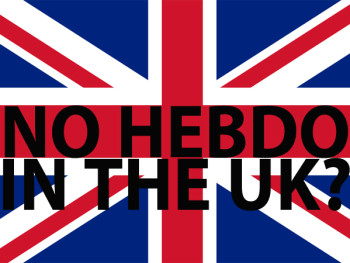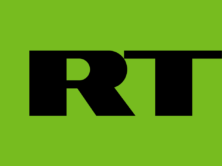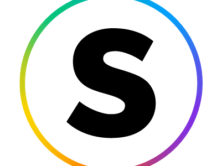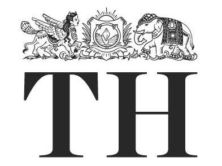
(Credit: iMediaEthics illustration)
None of the UK national press published any of Charlie Hebdo’s cartoons of Muhammad today, the Guardian reported.
iMediaEthics has previously reported on which outlets are and aren’t using images from the satirical magazine’s cartoons after the Jan. 7 attack on it that left a dozen dead.
Images are from the newspapers’ sites unless stated elsewhere.
The Times (Via Newseum)
The Independent
The Independent decided against using any Muhammad cartoons because it was “too much of a risk,” its editor Amol Rajan said, according to the Guardian.
“Every instinct that you have as an editor is to publish and be damned. You don’t like the idea of self-censorship, you don’t like the idea that you grant a victory to these religious fanatics by not publishing something that instinctively you would like to,” he said in an interview with BBC Radio 4, according to the Guardian.
“But the fact is as an editor you have got to balance principle with pragmatism, and I felt yesterday evening a few different conflicting principles: I felt a duty to readers; I felt a duty to the dead; I felt a duty to journalism – and I also felt a duty to my staff,” he went on.
“I think it would have been too much of a risk to unilaterally decide in Britain to be the only newspaper that went ahead and published and so in a sense it is true one has self-censored in a way that I feel very uncomfortable with… It’s an incredibly difficult decision to make.”
“What’s happened here is a bunch of religious fanatics have tried to silence cartoonists, have tried to silence satire. I think the important thing is not just whether you should show the prophet Muhammad, but to say that those cartoonists wouldn’t be silenced,” he said.
Listen to Rajan’s comments here.
The Telegraph
The Telegraph pointed iMediaEthics to its column today explaining: “Free speech offers latitude but not necessarily license. It does not follow that because many newspapers, such as this one, do not publish cartoons of Mohammed that somehow we have been intimidated into not speaking out. Any suggestion that a publication failing to follow Charlie Hebdo’s example is caving into terrorism is absurd: we all make editorial decisions to avoid offending people that have nothing to do with appeasing militant Islamists.”
The Guardian (via Newseum)
iMediaEthics asked the Guardian what its position on printing the cartoons is. A spokesperson pointed us to the paper’s Jan. 8 leader column on the matter.
The Guardian argued that newspapers don’t have to publish the most provocative Charlie Hebdo cartoons in order to support the magazine and its freedom to satirize.
“In social media, the call has been loud – and aimed at several British newspapers, including this one – to take a stand by publishing the very images that made Charlie Hebdo a target,” the Guardian reported. “For the most vociferous, republishing a sample of the magazine’s usual fare, which the Guardian has already done, is not enough: they insist that true defenders of free speech would reprint Charlie Hebdo’s depictions of the prophet Muhammad, especially the crudest, most scatological examples.”
The Guardian went on:
“That case is straightforward. Since these are the images the gunmen wanted to stop, the surviving free press is obliged to deny the killers that victory. No other gesture can show that we refuse to be cowed by their crime. By repeating Charlie Hebdo’s action, we would demonstrate our resistance to the edict the terrorists sought to enforce on pain of death. We show that Charlie Hebdo was not alone.
“There is an appealing simplicity to that stance, but it rests on faulty logic. The key point is this: support for a magazine’s inalienable right to make its own editorial judgments does not commit you to echo or amplify those judgments. Put another way, defending the right of someone to say whatever they like does not oblige you to repeat their words.
“Each and every publication has a different purpose and ethos. Charlie Hebdo is not the Guardian or the New York Times, nor is it the Daily Mail or Private Eye. The animating intention behind its work was to satirise and provoke in a distinctive voice, one that would not sit easily in other publications. Other publications can defend – and defend absolutely – the necessary diversity of press voices along with an editor’s right to offend. But the best response is not to be forced to speak in a different voice. The Guardian felt that at the time of the 2005 Danish cartoons controversy, and we feel it now. As Simon Jenkins argued on these pages on Wednesday, terrorists’ chief goal is to make us change our behaviour. It’s best to deny them that victory.”
The Guardian also pointed iMediaEthics to its publication of some of the Charlie Hebdo cartoons.
The Financial Times (via the Guardian)
iMediaEthics has asked the Financial Times what its policy is.
Daily Mail
iMediaEthics has asked the Daily Mail what its policy is for handling the cartoons.
The Metro (via: The BBC)
iMediaEthic has reached out to Metro.
The Daily Express
iMediaEthics has contacted the Daily Express for comment.
The Daily Star
iMediaEthics has asked Daily Star for its practice or policy.
The Mirror
We’ve reached out to the Daily Mirror for more information.
The Sun (via Kiosko.net)
iMediaEthics has asked the Sun for its decision on handling the images.
UPDATE: 1/8/2015 7:20 PM EST Added info from the Guardian









.JPG)






